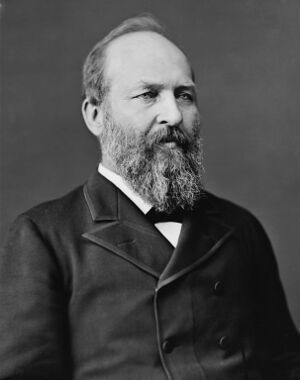Difference between revisions of "James Garfield"
Jump to navigation
Jump to search
(Unstub) |
|||
| Line 14: | Line 14: | ||
|start=March 4, 1881 | |start=March 4, 1881 | ||
|end=September 19, 1881 | |end=September 19, 1881 | ||
| − | |description=Assassinated | + | |description=Assassinated}}{{job |
| + | |title=US/House/Appropriations Committee/Chair | ||
| + | |start=March 4, 1871 | ||
| + | |end=March 4, 1875}}{{job | ||
| + | |title=US/House/Financial Services Committee/Chair | ||
| + | |start=March 4, 1867 | ||
| + | |end=March 4, 1871}}{{job | ||
| + | |title=US/House/Military Affairs Committee/Chair | ||
| + | |start=March 4, 1867 | ||
| + | |end=March 4, 1869}} | ||
}} | }} | ||
==Opinions== | ==Opinions== | ||
Revision as of 06:48, 27 July 2019
(politician) | |
|---|---|
 | |
| Born | November 19, 1831 |
| Died | September 19, 1881 (Age 49) |
| Nationality | US |
| Victim of | Assassination |
Opinions
A lawyer, Alfred Crozier reported to a US senate banking committee just before the creation of the US Federal Reserve, US President Garfield remarked that “Whoever controls the supply of currency would control the business activities of all the people.” [1]
Assassination
The official narrative blames Charles J. Guiteau, a "lone nut" disappointed office seeker, who shot Garfield on 2 July 1881. The wound was not immediately fatal for Garfield, but he succumbed on September 19, 1881. Guiteau was executed for the murder of Garfield in June 1882.
Many thanks to our Patrons who cover ~2/3 of our hosting bill. Please join them if you can.